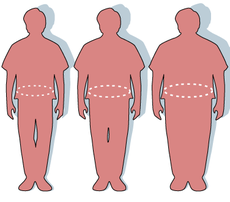This blog contains affiliate links. Thanks for your support 🙏

- Exercise
- Diet
- Weight Loss
- Avoiding sugar
The answer, surprising to many, is not diet, it is — weight loss! Losing about 5-10% of your body weight seems to have the most impact in reducing your risk of developing diabetes. In fact, every kilogram of weight loss lowers risk by 16%! This was shown in some good studies, especially an article in 2006 from Diabetes Care, called “Effect of Weight Loss with Lifestyle Intervention on Risk of Diabetes”. This study delved deep into the amazing research from one of public health’s most famous programs, the Diabetes Prevention Program, which studied thousands of pre-diabetics over many years. This program released a world-famous study in 2002 showing that aggressive lifestyle changes reduced a pre-diabetic’s chance of developing full-blown diabetes by an astonishing 58%; this was much more effective than the preventive daily pill, called metformin, which reduced risk 31%.
But this initial study didn’t specifically say which part of lifestyle changes was most effective; was it the weight loss, the increased exercise, or a diet overhaul? We found out the answer from this above 2006 follow-up study, which broke down the 2002 data. The main points:
- A 5% weight loss reduced risk 58%
- Second most effective: exercise. Those who met the goal (150 minutes a week of moderate exercise) reduced risk by 44%
- Third most effective: diet changes, especially reducing daily fat to <25% total daily calories
What this should mean for my readers, especially those who have been told they are pre-diabetic, is that you should focus first on losing at least 5% of your weight. Of course, a major component of weight loss involves more exercise and eating less fat, so it’s all connected. But what the data does mean is that if you only focus on exercise but are still gaining weight, or if you’re cutting fat but still not losing weight, then you need to rethink your action plans.
Other great news: the study also shows that those who achieved all three goals (losing >7% weight; exercising >150 minutes a week, and lowering diet fat <25%) lowered their risk of diabetes by over 80%! The figure below from this 2006 study clearly shows step-by-step lowering of risk with all 3 components; the dashed line shows the risk when weight loss is removed as a factor: as you see, there is still an improvement but not nearly as impressive:
I think this is a great study which really helps clarify people’s wellness plans for lifestyle choices. Now, the major question is — how to lose weight? Well, if I could figure that one out and patent it, I’d be rich. Serious weight loss is extremely hard, perhaps even more difficult than quitting smoking. What we do know is that diets do not work — people who repeatedly diet almost always regain weight plus a bit more. Nope, the simple answer, unfortunately, is that we all need to do the hard work of reevaluating our lifestyle; true and sustained weight loss must include diet changes and routine exercise. Don’t forget the golden rule of 150 minutes a week of heart-racing exercise.
Do You Know How Overweight You May Be?
I created a Body Mass Index (BMI) calculator on a previous post here, where you can see which category you fit: normal, overweight, obese, or morbidly obese.
More Information
The web has tons of information for diabetics, but here are a few detailed patient handouts from the UpToDate Patient Information website:
Patient Info on Diabetes Type 2
Patient Info on Diet and Diabetes
Other good bets would be from WebMD.com or the Mayoclinic.com.
Discover more from Richard Saint Cyr MD
Subscribe to get the latest posts sent to your email.
